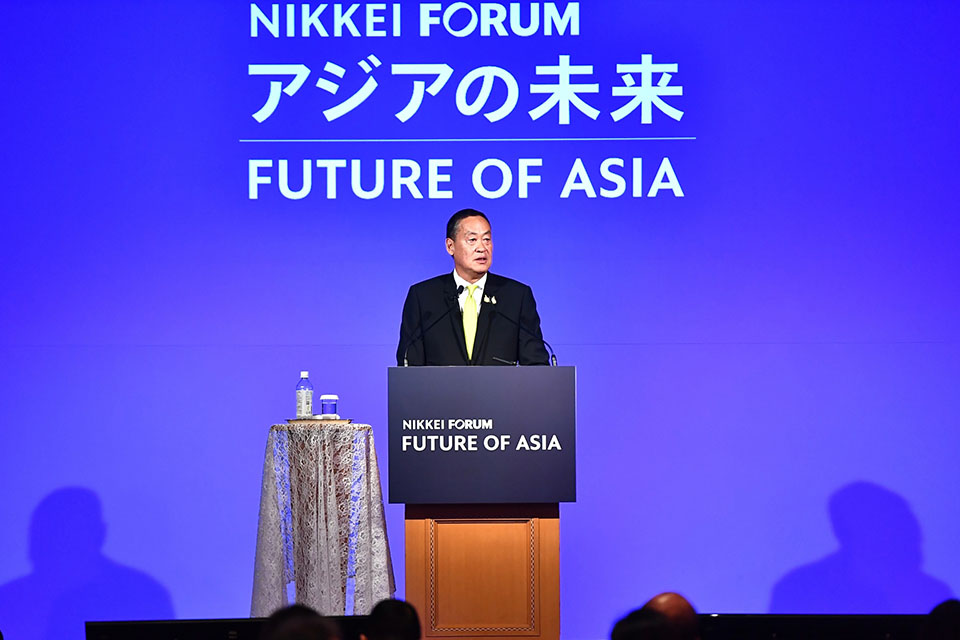
At the Imperial Hotel Tokyo, Japan, Prime Minister Srettha Thavisin attended the 29th Nikkei Forum Future of Asia, and delivered a keynote speech on “Asian Leadership in an Uncertain World” on May 24, 2024. Deputy Government Spokesperson Radklao Inthawong Suwankiri disclosed gist of his speech as follows:
The Prime Minister expressed pleasure to attend for the first time the 29th Nikkei Forum and added that he was here in Tokyo last December for the Commemorative Summit marking the 50th anniversary of cooperation between ASEAN and Japan, which set a clear direction for future work, based on mutual trust and heart-to-heart partnership Japan.
Today, the world is experiencing major shifts and challenges ranging from geopolitical conflicts, the economy, rapid advancement of technology, and the environment, made worse by the effect of COVID-19. While these challenges are immense, the Prime Minister also sees them as an opportunity for Asia to take leadership to tackle these challenges. He shared his perspective on a few of these problems, and on how Asia can work together to address them.
Problem number one: The Prime Minister thinks that Asia is the equilibrium while some say Asia is the main arena for superpower rivalry. Throughout all these years, major powers have made attempts to maintain the right ‘balance’ in engaging with Asia. This gives the region a unique position on the world stage.
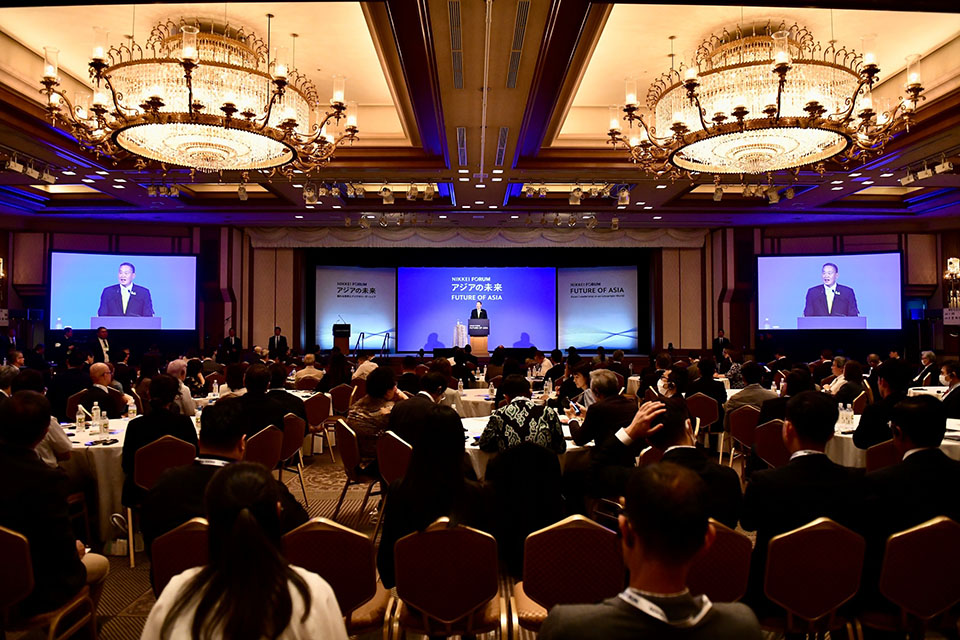
This is especially the case for Southeast Asia who strives to maintain ASEAN centrality and relevance, and navigate through geopolitical flashpoints to avoid further confrontations – whether it’s Myanmar, the Taiwan Strait, or the South China Sea, as well as the ongoing conflicts further away in Ukraine and in the Middle East. Despite the challenging geo-political and geo-economic landscapes, the agenda should be clear: to bring long-term prosperity to peoples and maintain peace and stability in the region. However, while ASEAN does not take sides, it remains vigilant and steadfast to safeguard its own interests. For example, on Myanmar, ASEAN is working together relentlessly towards a peaceful, stable, and unified Myanmar, and wants to see Myanmar back on the path of democracy. Thailand is working to help support peace dialogue. The country is coordinating closely with Laos, as ASEAN Chair, and neighboring countries of Myanmar. In the meantime, Thailand is now scaling up humanitarian assistance for the Myanmar people along the border. In the Prime Minister’s opinion, this is a solid example of how Asia can take the lead through collective efforts and unified voice, because together, we speak loudest.
Problem number two: It is said that multilateralism and globalization is on the decline. Superpowers rival against each other. Yet, the Prime Minister sees a silver lining. An opportunity to revive group spirits, and strengthen regional and cross-regional cooperation that is open and outward-looking. In his view, this should be the region’s new common agenda. Asian countries should stick together and work together even more closely.
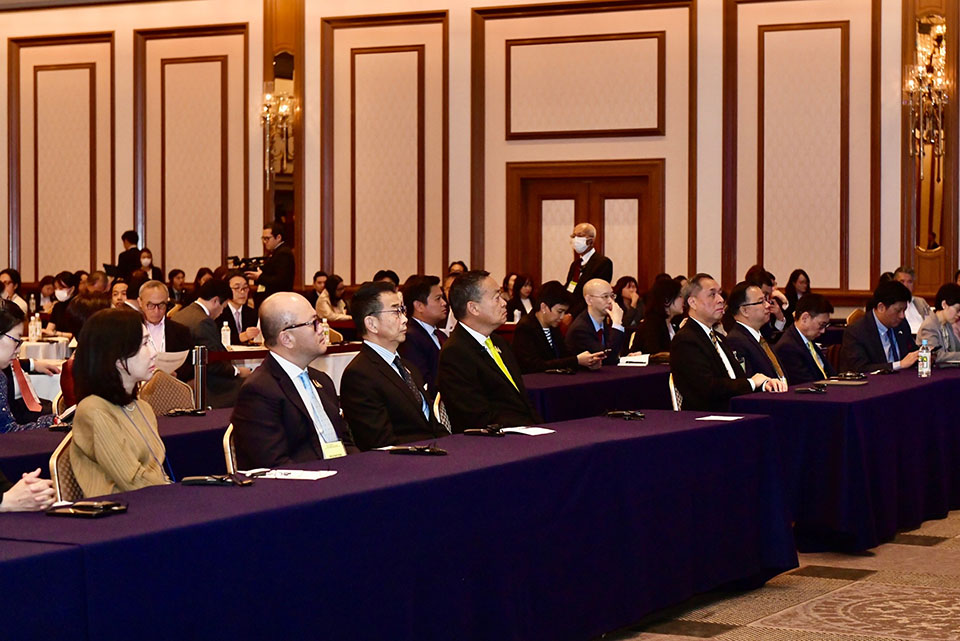
Problem number three: The world is fast evolving and going through massive technological changes —. Internet of Things, AI, financial technology, quantum computing, blockchain, etc., the so-called digitalization of life. These are the changes that transcend borders and bring about many profound challenges. While being excited about technological advancements may bring, it is also important to be mindful of the impacts, whether it be beneficial or damaging. To this end, there is a need to strike a balance between long-term initiatives, including formal education and up-skilling to promote digital literacy, and careful implementation of legal and regulatory frameworks that promote innovation.
The Prime Minister also emphasized the importance of building resilience within Asia. This is where Asia can make a difference. No one country will ever win this fight alone. In this ‘Asian Century’, Asia must remain together and continue to lead. This is because Asia is the part and parcel of the global engine. Asia is the factory and kitchen of the world, deeply rooted in the global supply chains. Asia is also the economic powerhouse, being home to over 4.78 billion people, which is more than half of the world’s population.
The Prime Minister mentioned 3 things at hand that urgently require Asia’s collective efforts to navigate through the stormy seas:
First is trade and investment. Because economic progress is the very foundation of peace and stability. It also underpins social and human development, as economic growth enables people to thrive. For the past decade, the region has been negatively impacted by the spillover effects of the geo-political conflicts around the world, and continues to see deepening fragmentation, leading to the re-shoring, near-shoring, and ‘friend-shoring’ phenomena. Asia must adapt to these new circumstances.
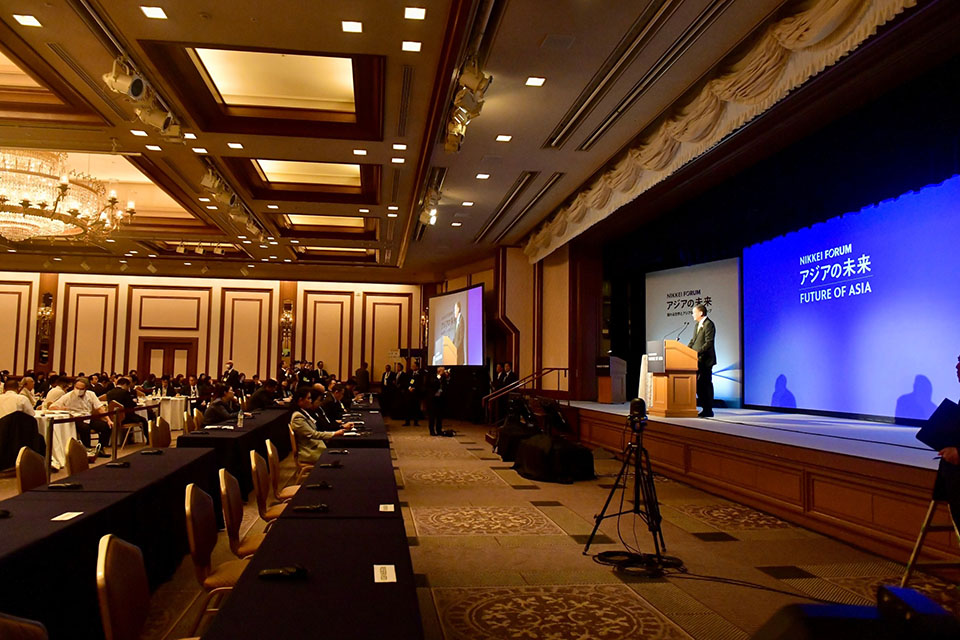
Asia was one of the hardest-hit by the COVID-19 pandemic, especially when all supply chains collapsed. However, it was also one of the fastest to recover. Asia rose to the challenge. Gradually and steadily, we have been expanding and gaining more influence and strategic importance. Looking towards the future, Asia should continue to lend its support to the multilateral trading system, with the WTO at its core. In this light, Asia must continue to deliver a free, open, fair, non-discriminatory, transparent, and inclusive trade and investment environment. The region has come far. This was possible through regional collective action such as RCEP, which was built upon the existing ASEAN+1 FTAs with partners including Japan, making it the largest FTA to date in terms of combined GDP, accounting for one-third of the world’s population. Still, Asia can achieve much more. The Prime Minister believes that FTA negotiations should be a top priority. FTAs must be utilized to boost trade and investment and diversify markets. Currently, Thailand has signed 15 FTAs with 19 countries, the latest one with Sri Lanka, with 7 more under way, EU and EFTA included.
Thailand is proud of its decision to submit the letter of intent to join the OECD. On this note, the Prime Minister personally thanked Japan for its outstanding support and for leading the charge in bringing the OECD closer to Southeast Asia. Thailand is determined to build the business ecosystem and enhance its global competitiveness to retain and attract investors.
Second issue at hand that urgently requires Asia’s collective efforts is the green transition. Climate action is no longer a trend or an option, it is the only chance of survival. This requires a global effort on all fronts. It is the responsibility of each and everyone. Being green starts at home. In the Government’s ongoing effort to cut emissions, Thailand’s first-ever Climate Change Act will come into force within the next few years. The Thai Government has also set up a new Department of Climate Change to oversee Thailand’s overall climate action. Thailand has been making good progress, especially in the energy and transportation sectors, and looks forward to welcoming more investments in the areas of green hydrogen and CCUS technology, as well as expanding carbon credit markets. On transportation, Thailand is working towards becoming the Future Mobility Hub and creating a comprehensive EV supply chain industry. The initial goal is to increase the production of zero emission electric vehicles (EVs) to 30% by 2030. However, it is the Government’s objective to support Japanese producers of internal combustion engine (ICE) vehicles in this transition period. Thailand has long valued the indispensable role of Japan and Japanese investors in building a solid foundation for the automobile industry in the country.
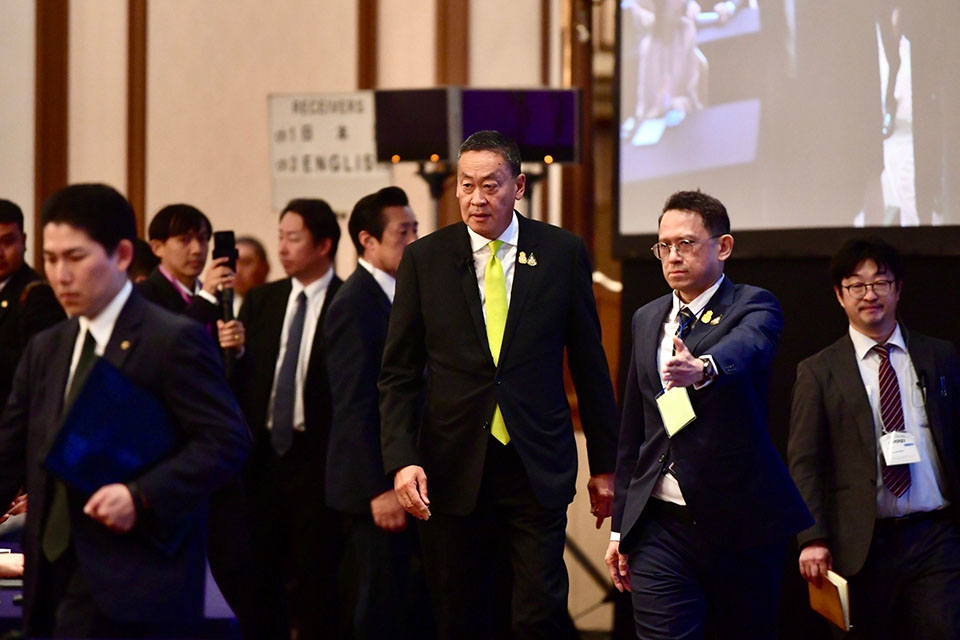
The Prime Minister also mentioned ASEAN’s collective efforts to build the “ASEAN Power Grid”, which will help increase the share of renewable energy in the region. Thailand alone plans to increase the share of clean and renewable energy in power production to at least 50% by 2040. To build an entire ecosystem and infrastructure for clean energy, private sector and financial institutions are indispensable players. They should be provided with both tax and non-tax incentives. Moreover, sustainable and green finance can be the main driving force. Thailand has been issuing green bonds since 2021. Additional series of sustainability-linked bonds will be rolled out this year, amounting to about 1 billion USD. The country welcomes participation from all of Asian investors to drive the region towards a more sustainable future.
Third is digitalization. The Prime Minister wants to create, not only a digital economy, but a full-fledged digital society, where digitalization becomes a part of the people’s everyday lives. For Thailand, digitally active citizens already paved the way for this change. It was accelerated by the impacts of COVID-19 which made fast payment systems via QR-code, food delivery applications, and online shopping become a necessity. Today, Thailand’s cross-border payment system is already linked with a number of countries, mostly ASEAN, as well as Japan, which is one of the most popular tourist destinations of all time among the Thai people.
Earlier this month, Microsoft CEO announced the plan of investment for a digital-first and AI-powered future, through its new regional datacenter in Thailand, along with other projects to up-skill the young digital talents and tech workforce of the whole ASEAN. This is a ground-breaking development for Thailand, and is fundamental to the country’s growing high-tech and cloud-based digital industries. This will enable Thailand to take that crucial leap to fully capture massive potential in the digital economy. On top of that, ASEAN is currently negotiating on the Digital Economy Framework Agreement (DEFA). Once completed, it will become the world’s first regional agreement of its kind. It is projected to double the value of the region’s digital economy to 2 trillion USD by 2030.
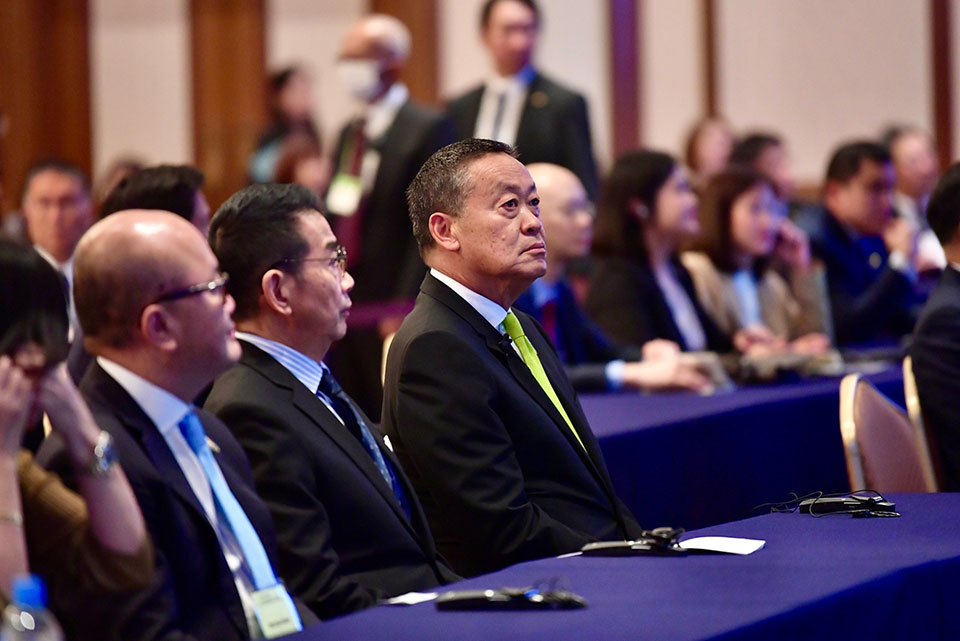
The Prime Minister expressed belief that these three things will bring Asia closer to the world that the region aspires to see. Each Asian country has a shared responsibility, and no one can achieve this alone. Platforms like the Nikkei Forum should continue to bring the public and private sectors together to share thoughts, best practices, and lessons learned. Because the business community is truly behind the Rise of Asia.
In closing, the Prime Minister emphasized that Asia must maintain collective leadership to re-ignite growth and restore trust in the global system. Because that is the region’s true strength. This is the Asian Century. It’s now time to walk the talk and put things into action. He also affirmed that no matter what the future may bring, Thailand will always stand beside Japan, the country’s true and trusted friend. (PRD)








